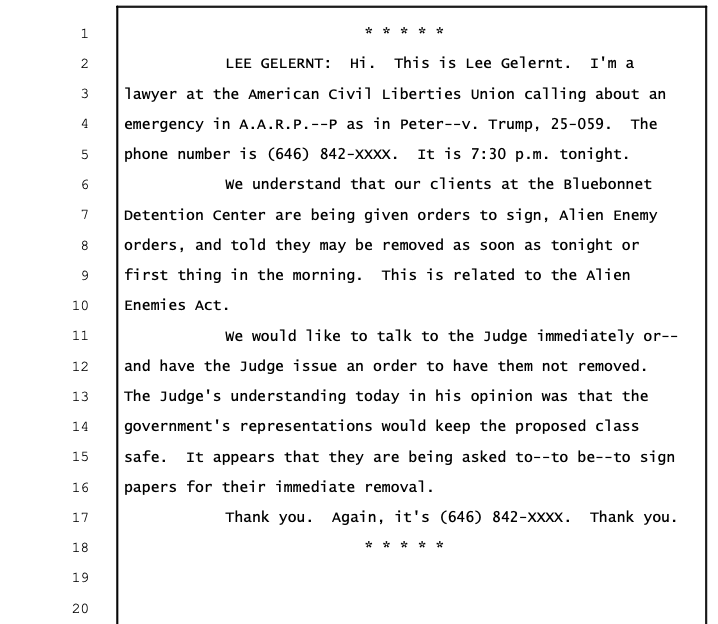A Texas federal judge publicly reprimanded an attorney for migrants facing deportation over an improper out-of-court voicemail a lawyer left for the judge in the dispute over President Donald Trump‘s Alien Enemies Act policy.
U.S. District Judge James Wesley Hendrix, presiding over a habeas petition involving Venezuelans allegedly tied to the Tren de Aragua gang, criticized American Civil Liberties Union attorney Lee Gelernt for leaving a voicemail on his chambers’ line after hours on April 17. The message sought emergency relief to block deportations under the Alien Enemies Act, without notifying the Trump administration’s legal team, a move the judge deemed a prohibited “ex parte” communication.

In a little-noticed court order issued Monday, Hendrix noted the voicemail addressed the substance of motions and constituted an attempt to secure a temporary restraining order “off the record, ex parte, and in the evening,” a direct violation of judicial standards.
Hendrix further noted that the petitioners had previously been instructed to file all requests in writing and had not demonstrated any legal basis for bypassing those rules.
“In light of the rules governing ex parte communications and the substance of the voicemail, the Court notes for the record that it will not permit or consider the voicemail,” the judge wrote, also attaching a transcript of the voicemail left for him on April 17.

Toward the end of his message to the court, Gelernt said: “We would like to talk to the Judge immediately or– and have the Judge issue an order to have them not removed.”
Hendrix left the door open for either party to reply to his order if they believe “a response is necessary,” and since then, the incident has drawn growing scrutiny from legal observers and public officials.
That leads us to Today, when Judge Hendrix issues a scathing opinion to the ACLU lawyer for his prohibited ex parte communications on Apr. 17, violating the federal code of conduct. Did the ACLU do this with other judges? With Boasberg? https://t.co/pU4lS3sbwN
— Eric Schmitt (@Eric_Schmitt) April 22, 2025
“Did the ACLU do this with other judges? With Boasberg?” asked Sen. Eric Schmitt (R-MO), a former state attorney general, in a post on X, referring to U.S. District Judge James Boasberg, who originally took up an Alien Enemies Act lawsuit in Washington.
The ACLU’s case before Boasberg has since fallen flat after the Supreme Court ruled on April 7 that deportation cases involving the Alien Enemies Act must be heard in the jurisdiction of confinement, shifting legal challenges from Washington, D.C., to Texas.
Last week, the civil rights group filed emergency motions in Hendrix’s court, seeking to block the Trump administration from removing detainees to El Salvador.
Judge Hendrix denied the ACLU’s initial motion on April 18, stating that the government must be allowed 24 hours to respond. The following day, the ACLU again filed an emergency motion, this time giving the court just 42 minutes to act before treating that inaction as a denial and appealing directly to the Supreme Court.
The U.S. Court of Appeals for the 5th Circuit ruled late Friday that it lacked jurisdiction, as no ruling had yet been issued by Hendrix. But the Supreme Court still stepped in early Saturday morning, just after midnight, and temporarily blocked the deportations pending further review — effectively freezing the district court’s authority.
Legal experts say the ACLU’s tactic of contacting Hendrix outside of court after business hours serves as a major problem for the proper rule of law.
“The mere fact that the plaintiffs perceive an emergency does not excuse the plaintiffs from following the usual rules,” Josh Blackman, a professor at South Texas College of Law, wrote for Reason‘s Volokh Conspiracy blog.
As for what is next, the Trump administration is likely to respond to the Supreme Court in response to its rare Saturday morning order.
ALITO’S DISSENT HIGHLIGHTS CONCERN OVER SUPREME COURT SHORTCUTS
Schmitt said he believes the Trump administration should “ask for sanctions” over the ACLU’s improper communications. It is not immediately clear whether the administration will pursue sanctions.
The Washington Examiner contacted the Trump administration and the ACLU for comment.
























